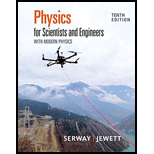
(a)
The current in the inductor.
(a)
Answer to Problem 16P
The current in inductor in the terms of time is
Explanation of Solution
Given info: The value of resistance
Formula to calculate current in a loop as per Kirchhoff law is,
Here,
Write the expression for net voltage in loop 1,
Write the expression to calculate net voltage in loop 2,
Here,
Substitute
Substitute
Arrange the terms of above equation to simplify for integration.
On integrate,
Assume
Differentiate above equation,
Substitute
Substitute
Apply boundary condition,
Substitute
Substitute
Further solve the above expression.
Thus, the current in inductor in the terms of time is
Conclusion:
Therefore, the current in inductor in the terms of time is
(b)
The current in the switch as a function of time.
(b)
Answer to Problem 16P
The current in the switch as the function of time is
Explanation of Solution
Formula to calculate current in inductor, from equation (VII)
Formula to calculate current in switch, from equation, from equation (IV)
Substitute
Thus, current in switch is
Conclusion:
Therefore, the current in switch is
Want to see more full solutions like this?
Chapter 31 Solutions
Physics for Scientists and Engineers with Modern Physics
- 8. With the aid of a diagram draw the following electric circuit and use the resistor as the load, (a) Closed circuit (b) Open circuitarrow_forwardLab 8 Part 3 PHET Wave Interface simulation. I am having trouble with this part of the lab.arrow_forwardMick and Rick are twins born on Earth in the year 2175. Rick grows up to be an Earth-bound robotics technician while Mick becomes an intergalactic astronaut. Mick leaves the Earth on his first space mission in the year 2200 and travels, according to his clock, for 10 years at a speed of 0.75c. Unfortunately, at this point in his journey, the structure of his ship undergoes mechanical breakdown and the ship explodes. How old is Rick when his brother dies?arrow_forward
 Physics for Scientists and EngineersPhysicsISBN:9781337553278Author:Raymond A. Serway, John W. JewettPublisher:Cengage Learning
Physics for Scientists and EngineersPhysicsISBN:9781337553278Author:Raymond A. Serway, John W. JewettPublisher:Cengage Learning Physics for Scientists and Engineers with Modern ...PhysicsISBN:9781337553292Author:Raymond A. Serway, John W. JewettPublisher:Cengage Learning
Physics for Scientists and Engineers with Modern ...PhysicsISBN:9781337553292Author:Raymond A. Serway, John W. JewettPublisher:Cengage Learning Principles of Physics: A Calculus-Based TextPhysicsISBN:9781133104261Author:Raymond A. Serway, John W. JewettPublisher:Cengage Learning
Principles of Physics: A Calculus-Based TextPhysicsISBN:9781133104261Author:Raymond A. Serway, John W. JewettPublisher:Cengage Learning Physics for Scientists and Engineers: Foundations...PhysicsISBN:9781133939146Author:Katz, Debora M.Publisher:Cengage Learning
Physics for Scientists and Engineers: Foundations...PhysicsISBN:9781133939146Author:Katz, Debora M.Publisher:Cengage Learning Physics for Scientists and Engineers, Technology ...PhysicsISBN:9781305116399Author:Raymond A. Serway, John W. JewettPublisher:Cengage Learning
Physics for Scientists and Engineers, Technology ...PhysicsISBN:9781305116399Author:Raymond A. Serway, John W. JewettPublisher:Cengage Learning





